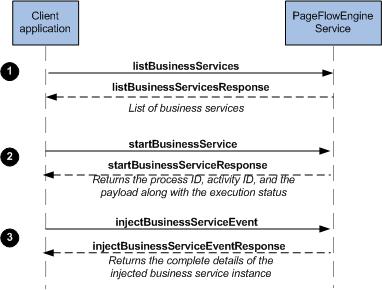Injecting a Business Service Event
You can inject data to a business service multiple times while it is in progress, regardless of whether the flow from any previous occurrence is still in progress.
You can use an event handler to do so. An event handler is a catch intermediate event with no specific trigger and incoming flow that can be triggered by an external client application using the BPM API. Note that the event handler does not have to happen for the business service to complete.
The example here illustrates injecting a business service event. It involves listing all the deployed business services, starting a business service, and while it is running, injecting a business event.
The following step-by-step descriptions correspond to the numbered steps in the illustration above. Note that the descriptions are from a web service operation point of view, and provide an example of performing the operations using the web service API (SOAP). (For an equivalent example using the Service Connector API (Java), see Injecting a Business Service Event — Service Connector API Example (Java).)

